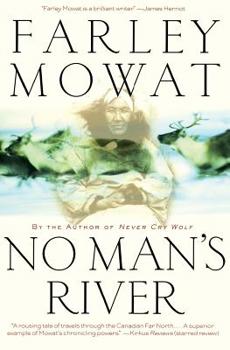No Man's River
Select Format
Select Condition 
Book Overview
With No Man's River, Farley Mowat has penned his best Arctic tale in years. This book chronicles his life among Metis trappers and native people as they struggle to eke out a living in a brutal environment. In the spring of 1947, putting the death and devastation of WWII behind him, Mowat joined a scientific expedition. In the remote reaches of Manitoba, he witnessed an Eskimo population ravaged by starvation and disease brought about by the...
Format:Paperback
Language:English
ISBN:0786716924
ISBN13:9780786716920
Release Date:January 2006
Publisher:Da Capo Press
Length:320 Pages
Weight:1.03 lbs.
Dimensions:1.0" x 5.4" x 8.3"
Customer Reviews
4 ratings
Amazing, as always
Published by Thriftbooks.com User , 19 years ago
No matter how many books he writes, Farley Mowat continues to amaze his fans. His non-fiction is never dry or uninspiring, though he's a talented fiction writer as well, and this faithful reader of his work is certainly not disappointed. Thank you again, Mr. Mowat for your great writing. It is truly appreciated! Chrissy K. McVay
A priceless look into a word that is probably gone forever.
Published by Thriftbooks.com User , 19 years ago
A book I could not put down. It is a well written insight into a world that none of us will ever experience. Mr. Mowat is a great story teller and a national treasure. Anyone who is interested in the least about people and lands of the north must read this book.
Another outstanding book by Farley Mowat
Published by Thriftbooks.com User , 19 years ago
Farley Mowat has been one of my favorite authors since I was in 6th grade in the early 1960s. I ordered a copy of "Two Against the North" from the Arrow Book Club and read it over and over. The story of two boys from different cultures trying to survive winter in the barrens was riveting to me, a gal firmly stuck in the suburbs. Mowat's descriptions of glacial landforms in that book remained with me and were recalled with every earth science and geology lesson I ever took. (The book can be found in some libraries under the title "Lost in the Barrens"--a great read for a middle schooler curious about the world outside familiar places.) Part of what I loved about No Man's River was that the journeys described were clearly the basis for many aspects of "Lost in the Barrens"--kind of like an echo of an old favorite. Mowat is the consummate story teller--reading his books makes you want to sit around a campfire with him for several hours hearing spin his yarns. One of my favorite quotes comes from him--"Never let the facts get in the way of a good story." No Man's River has jaw-dropping adventure as well as thought provoking commentary on the clash of vastly different cultures. Enjoy!
Tough Guy in a Tough Land
Published by Thriftbooks.com User , 20 years ago
Readers can count this book as one more captivating true tale of Canada's far north, told by its best-read authority. The young Farley Mowat, returning disillusioned from the War in 1947 and thinking to become a biologist, joined with a taxonomist on a collecting "scientific" expedition into the Barren Lands of Northern Manitoba and Saskatchewan. The headstrong 26 year old was improbably paired up with a disciplined naturalist of the old school, who killed and skinned every animal he could shoot, poison or trap. After a while, Farley, having seen enough killing in the war, became disillusioned with this approach to appreciating the wonders of nature, and deserted his post in favor of exploring the largely uninhabited territory in the company of an Indian half-breed, Charles Schweder. His real desire was to contact the "People of the Deer," the Imhalmiut. These people came to be idealized in Farley's mind as a people "uncontaminated with the murderous aberrations of civilized man." Mowat gives a clear picture of the hardships encountered by the few inhabitants of this harsh landscape. By the time of the expedition, the Imhalmiut had dwindled to only a few scattered bands, having been nearly wiped out in a succession of epidemics. Farley tells of the well-intended but sporadic and largely ineffectual aid given to them by the Canadian government and its minions, and how Schweder had been traumatized by his experience in a partially successful rescue attempt he had made the year previous. His rescue of a six year old replacement for his child bride, dead of starvation, presents the reader (and Mowat) with a thought- provoking moral dilemma. So much for the myth of the noble savage... For me, though, the message of the book was how uncaring and ruthless "Mother Nature" really is, and how down and dirty a bare-handed struggle it is. He, Thoreau-like, at one point meticulously gives a complete list of the things they chose to carry on their epic trip down an unmapped river system: guns and ammo, flour, sugar, baking soda, canned food, gasoline and oil for their outboard motor, tarps and tents. Even with all these products of Western technology, their trip was hair-raising and nearly disastrous. And the bugs! For such a rough subject, this turns out to be an engrossing tale and hard to put down. On the other hand, the map requires a magnifying glass to read and there are no illustrations. I really appreciated, though, the last chapter, in which he follows up on the fate of the characters he encountered, giving the reader some "closure" as it is disgustingly called these days. I found it a little curious, though, that Mowat felt the need to apologize in a postscript for his use of some now politically incorrect words, such as Indian, half-breed, and Eskimo. This is largely a story of the encounters of people with different cultures, of different races, viewed through eyes that are quite a bit more honest than is usually tolerated by





